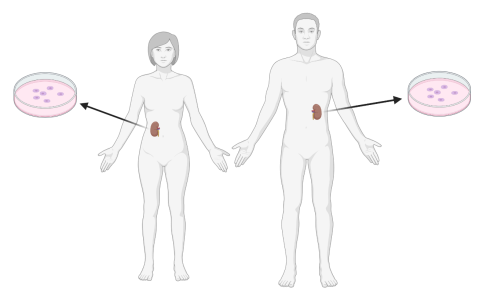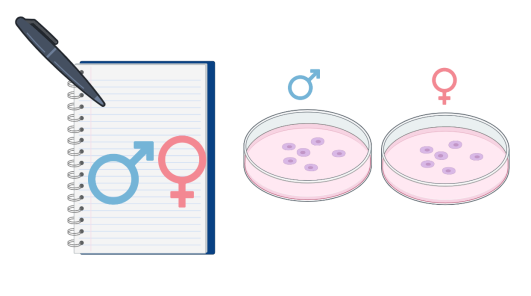Research Group Judith Lechner
Group/personal information
Group leader: Ao.Univ.-Prof.in Dr.in Judith Lechner
Location: Schöpfstr. 41/ 1st floor, office 159
Email: Judith.Lechner@i-med.ac.at
Phone: +43 (0) 512 9003 70825

Animal-free sex specific human kidney models derived from induced pluripotent stem cells (iPSCs)
Women are not small men. Sex and gender differences affect all the organs in the body. Sex as a biological variable should be included in all preclinical studies similarly as clinical studies should involve men and women according to the NIH and the EU research funding policies.
Experimental animals are the predominant research model, but ethical considerations and concerns about transferability of animal-derived data to humans mandate the development of human in vitro models.

Created with Biorender.com
We use human proximal tubular like cells from iPSC lines, which were developed during the STEMBANCC IMI Innovative Medicines Initiative, to establish and characterise novel, sex-specific, in vitro systems to model sex differences through modification of iPSC-differentiation protocols. The differentiated cells are subjected to acute sex hormone treatments mimicking the effects of the natural menstrual cycle or hormone changes due to menopause.
Our aim is to study the mechanisms of sex differences in the cellular responses to environmental challenges and toxic stimuli. In collaboration with Annemarie Weissenbacher from the Univ.-Clinics for Visceral, Transplant and Thoracic Surgery we use our in vitro models to study factors influencing the survival and fitness of transplant donor kidneys in normothermic machine perfusion.
References:
Waldnig, C: Functional characterization of kidneys in normothermic machine perfusion, PhD thesis ongoing
Huss, S: Claudin-2 and Angiotensin Converting Enzyme II expression in female and male induced pluripotent stem cell derived proximal tubule like cells, diploma thesis 2023
Sarnighausen, H-U: Sex specific difference in Cisplatin nephrotoxicity, diploma thesis 2023
Lang T: Influence of sex on cisplatin-induced nephrotoxicity in an iPSC-based model, diploma thesis 2022
Chandrasekaran et al: Generation and characterization of iPSC-derived renal proximal tubule-like cells with extended stability, Sci Rep 2021 https://www.nature.com/articles/s41598-021-89550-4
Schoepf C et al: Selected ionotropic receptors and voltage-gated ion channels: more functional competence for human induced pluripotent stem cell (iPSC)-derived nociceptors, Brain Sci 2020 https://www.mdpi.com/2076-3425/10/6/344
Schmiedinger T, et al: Interdigitated aluminium and titanium sensors for assessing epithelial barrier functionality by electric cell-substrate impedance spectroscopy (ECIS), Biomed Microdevices 2020 https://link.springer.com/article/10.1007/s10544-020-00486-4
Lechner J et al: Sex and Sex Hormones in Tissue Homeostasis, Homeostasis - An Integrated Vision. IntechOpen; 2019. http://dx.doi.org/10.5772/intechopen.76177
Seppi T et al: Sex differences in renal proximal tubular cell homeostasis, J Am Soc Nephrol 2016 https://journals.lww.com/jasn/fulltext/2016/10000/sex_differences_in_renal_proximal_tubular_cell.17.aspx
Lechner et al: Monitoring of the dynamics of epithelial dome formation using a novel culture chamber for long-term continuous live-cell imaging, Meth Mol Biol 2011 https://link.springer.com/protocol/10.1007/978-1-61779-191-8_11
Inclusion of sex as a biological variable in the stem cell research community
The SAGER (Sex and Gender Equity in Research) guidelines were developed to aid scientists to include sex and gender in medical research as mandated by major international research funding agencies (NIH, EU) and renowned scientific publishers. The SAGER guidelines address inclusion of sex as a biological variable in the research design and specifically point out, how the resulting findings should be reported: Data should be routinely presented disaggregated by sex and gender. In the Introduction and Discussion expected sex and/or gender differences should be addressed and discussed. If only one sex (or gender) is accounted for, this should explicitly be mentioned in the Title and justified in the Methods section. (https://ease.org.uk/communities/gender-policy-committee/the-sager-guidelines/).

Created with Biorender.com
We have set our goal to find out, if these requirements are met by the stem cell research community. For this aim, we analyze how sex as a biological variable is accounted for by recent publications in the stem cell research field. As a preliminary result, among 200 randomly chosen scientific articles only about 36 % mentioned the sex of the stem cells that were used as research models. Among the articles mentioning sex, a significant male bias was noted. The SAGER guidelines were ignored by 99 % of the authors despite publisher and/or journal policies explicitly recommending or requiring them.
Reference:
Kriechhammer, A: Sex equity in stem cell based research, diploma thesis 2023
Improving student learning outcomes in Medical Physiology
In the frame of a teaching project we aim to improve the learning outcomes of students in Medical Physiology. For this goal we apply digital teaching and learning tools to structure the student’s preparation phase for our practical Physiology teaching courses. In class, the students use the digital learning platform to retrieve their individually prepared results and solve the Physiology case-based and experimental problems in a team–based learning format.

Created with Biorender.com
Reference:
Unterkalmsteiner J: Digital teaching and learning tools to improve student learning outcomes in on site practical Physiology courses – Promotion of “understanding”, “applying” and “analyzing” skills according to Bloom’s taxonomy of educational outcomes, Diplomarbeit ongoing



